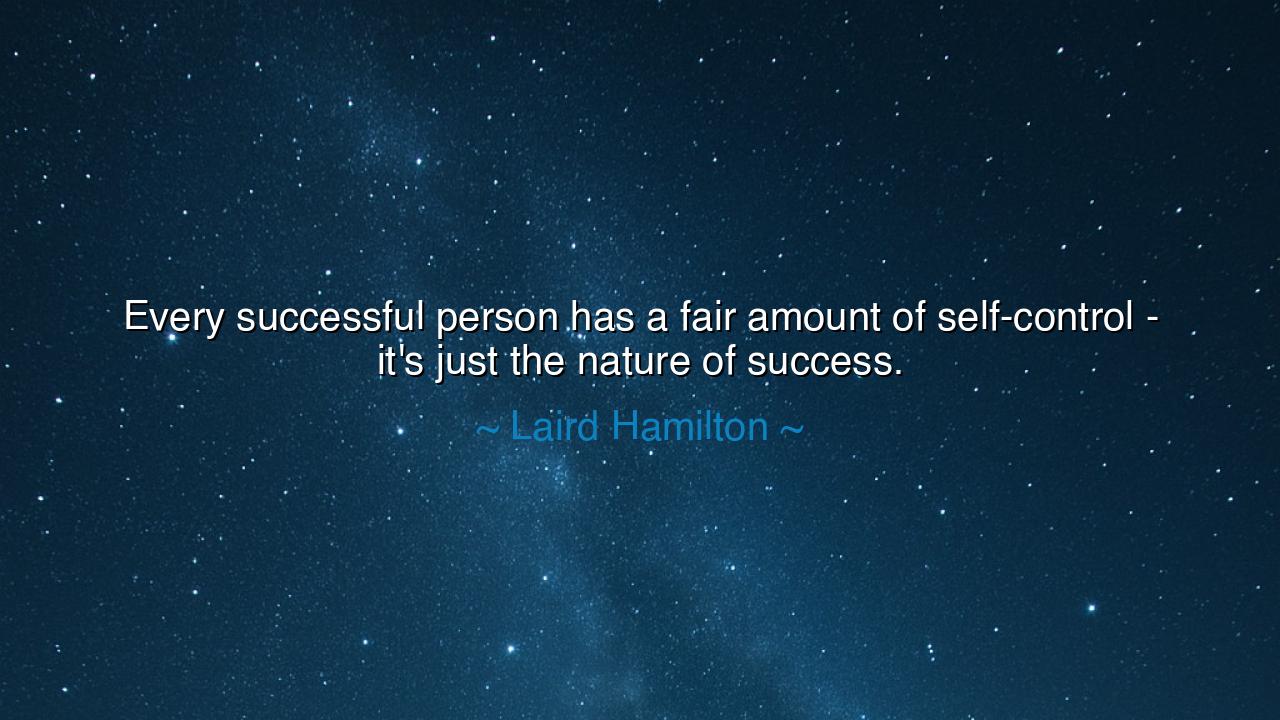
Every successful person has a fair amount of self-control - it's
Every successful person has a fair amount of self-control - it's just the nature of success.






In the words of Laird Hamilton, “Every successful person has a fair amount of self-control – it’s just the nature of success.” This saying echoes like an ancient maxim, one that carries the weight of truth across generations. It tells us that greatness is not born from chaos, nor from unchecked desire, but from the steady hand of discipline. The rivers of talent and ambition, if left to flow wildly, carve no useful path. But when bound by the banks of restraint, they forge valleys that nourish civilizations. Thus, Hamilton speaks of the unseen pillar that holds up all achievement: the mastery of oneself.
Consider the word self-control. To the ancients, it was no mere virtue, but the very foundation of wisdom. Plato spoke of temperance, the balance of the soul. The Stoics declared that a man enslaved to his passions could never be free. Even in the East, the sages of old counseled that to rule a kingdom, one must first rule his own heart. This is the eternal truth that Hamilton compresses into his modern words: the victorious do not conquer others first—they conquer themselves.
We may find the spirit of this wisdom in the tale of Alexander the Great. His armies marched from Greece to the far reaches of India, and he was hailed as a god among men. Yet what was his undoing? Not an enemy’s sword, but the fire of his own unrestrained desires. For while he commanded empires, he often lost command of himself, and in drunken rage or pride, he brought ruin to what he had built. His story reminds us that success without self-control is fragile—like a mighty tree hollowed at the core, doomed to fall at the first strong wind.
In contrast, look upon the life of Mahatma Gandhi. His triumph was not in battles won with weapons, but in the strength of self-discipline. He reigned over his own body and spirit—fasting, restraining anger, choosing silence where others would shout. His restraint became his greatest power, a force that shook empires without lifting a sword. Here lies the proof that Hamilton’s words are no mere observation, but an eternal law: true success is born of those who master themselves before all else.
But why is this so? Because the path to greatness is long, filled with temptations, diversions, and storms of doubt. Only those who have forged chains of self-control can withstand the lure of ease, the seduction of comfort, or the poison of arrogance. Talent may open the door, opportunity may beckon, but it is discipline that keeps the flame alive when all else wanes. Success, then, is not a matter of luck or chance—it is the daily victory of the will over the weakness of the flesh.
To you who listen, take this as your teaching: if you seek to be strong, first learn restraint. Do not despise small acts of control, for they are the stones that pave the road to greatness. Rise early when sloth tempts you to linger. Hold your tongue when anger burns hot upon it. Choose water over wine when excess calls to you. These victories may seem small, but they sharpen the blade of your spirit, until you become one who is unshakable in the face of greater trials.
Remember always: Hamilton’s words are not merely about the successful, but for those who would be. Every master was once an apprentice of discipline, every victor once a struggler against his own desires. If you wish to stand among them, begin today. Choose one act of self-control and hold to it. Let it grow, and soon you will discover that you, too, walk in the company of the strong. For in mastering yourself, you become unassailable, and in being unassailable, you become truly free.






AAdministratorAdministrator
Welcome, honored guests. Please leave a comment, we will respond soon